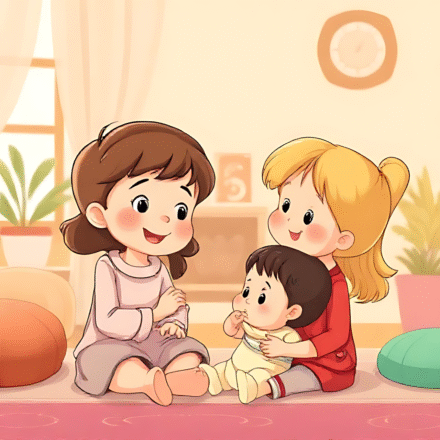Are you looking for ideas to soothe your colicky baby? Your baby looks so tired but fights sleep. And if you’ve been there, you know this soul-sucking paradox is one of the most frustrating problems of parenthood. An overtired baby can rapidly spiral into hysterics – and at that stage, it can seem like there is no way to restore calm. But thankfully, there ARE gentle and effective solutions we can use to break this cycle and to help your overtired baby fall asleep. This guide is a complete resource for parents of babies and toddlers to provide you with evidence-based knowledge on how to spot over tiredness early and some calming strategies to help stop it before it jumps the exit sign to yelling, screaming and full meltdown mode!
Understanding the Overtired Baby Dilemma
Why do babies fight sleep when they’re overtired?
When a baby is chronically overtired, their body is awash in cortisol, adrenaline and other stress hormones. This creates a “second wind” response that can frustrate a further effort to soothe your baby. It seems logical that a overly tired baby would look wired, cranky, or unsatisfied. This biological response may help explain the paradox of exhaustion versus activity.
Acknowledging that paradox is the first step of disentangling that web. Your baby is not being fussy, their nervous systems are simply not capable of self-regulation this early in the game. An over tired baby is a sign of a baby seeking help.
How to Tell If Your Baby Is Overtired
Noticing over tiredness early can help avoid full meltdowns. Watch for these telltale signals :
- Increased fussiness and irritability
- Arched back and rigid body
- Avoiding eye contact
- Frantic movement or hyperactivity
- Rubbing eyes, ears, or hair
- Short “micro-naps” followed by waking
- Intense crying that intensifies when you try to help
The sooner you recognize these signs, the more quickly you’ll be able to help your baby calm down and settle in for sleep.
Now A Few Quick Calming Techniques for Overtired Babies
Make a Sensory Sanctuary
Over tired babies usually find their surroundings to be distressing and over stimulating. Putting baby in a soothing environment can help them reset their nervous system.
To make everything nice and quiet :
- Darken the room, or close the blackout curtains
- Minimize distraction use constant white noise at about 50-60 dB.
- Maintain temperature at 68-72F (20-22C).
- Put away arousing toys in where baby is going to sleep
- Try slow and gentle movements, such as rocking or swaying.
Many parents find that darkness, white noise, and gentle motion is the magic solution to calming their baby when they are very overtired!

Practice the 5 S’s for Instant Calm
Dr. Harvey Karp, a pediatrician, created the 5 “S’s” method to calm tired babies that has worked for many parents after trying this technique :
- Swaddle : Use a snugly wrapped baby (if under 2 months or not rolling).
- Side/Stomach : When not sleeping, position baby to lay on their side or stomach.
- Shush : Cuddle baby near your ear and shush them for a longer period of time.
- Swing : Continuously move back and forth in a gentle way.
- Suck : breast feed, bottle or pacifier(Decision).
These tactics complement each other quite well, as it turns out, to induce a calming reflex in most babies. But if your baby is especially tired, you may want to use all five techniques at the same time.
Preventative Strategies to Avoid Over tiredness
Establishing Age-Appropriate Sleep Schedules
It is always easier to prevent than intervene. That over tiredness stage can be avoided by sticking to wake windows that are suitable for your baby’s age :
Babies (0-3 months old) : Babies at this age should get 45-60 minutes of awake time in between sleep periods.
3-6 months : 1.5-2. 5 hours awake time
For 6-9 months : Up to 2-3 hours awake time
9-12 mos : 2.5-4 hours of awake time
Pro tip : Monitor your baby’s natural rhythms for a few days to zero in on their best sleep windows, and then schedule naps accordingly.
Creating Consistent Sleep Routines
Babies thrive on predictability. A little routine shows your baby that sleep is coming :
- Strictly maintain bedtime within a half hour period
- Create a 15-20 minute per-sleep routine (bath, massage, story, song)
- Be consistent with sleep associations (like the same swaddle, white noise, etc.)
- Look for signs of early tired, such as becoming quiet, less active, yawning, or rubbing his or her eyes.
Having a predictable bedtime routine has improved the ability of babies to transfer themselves (and fall back to sleep) between sleep cycles, decreasing instances of over tiredness dramatically.
R. His Story: ‘There’s Nothing That Reverses What Happened’ Some Threshold for Risk He Was Under Oath When He Took These Assaults Seriously Nowhere to Go.
Reset an Overwhelmed Baby
For times when the usual methods are ineffective, give these reset strategies a shot :
- Change your setting – Go outside for fresh air
- Transfer baby to a second caregiver if able.
- Try something surprising – a warm bath or skin-to-skin contact
- Let the water’s gentle movement do the work – a warm bath can be instantly calmingan be instantly calming
When to Seek Professional Help
It is normal to have some over tiredness and manage this but sometimes these problems continue and you may need some external assistance.
- You always have a hard time falling asleep when you’re supposed to
- Continuing crying for more than 3 hours.
- You have sleep problems and developmental worries
- You’re burnt out as a parent, and you can’t keep up
Pediatricians, GPs, and certified pediatric sleep consultants (CPCs) can all offer advice as well as customized methods to help support you through any ongoing sleep struggles.

Conclusion : Trust Your Instincts
To know how to calm an overtired baby quick and easy demands patience, observation, and discipline. Every baby is different and it’s nice to know that what works for one person may not work for another. What matters is watching your baby’s cues and responses and adjusting how you calm your baby. As you practice, you’ll learn to have a good knowledge of your baby’s needs, and how to feel about their needs more than the actual time of day. As you figure out how to tackle those overtired moments, your confidence will grow, and less stress, and long, sleepy days and peaceful nights will lie ahead for your family.
Frequently Asked Questions
Why do babies show increased activity levels when overtired?
When babies are overtired, their bodies are releasing stress hormones (adrenaline and cortisol), causing them to have a “second wind.” Being overtired activates hormone responses that make babies look wired and hyper, and it adds characteristics of avoiding sleep even though they look like they might drop from fatigue.
How can I tell if my baby is overtired or under tired?
An overtired baby will usually show signs of extreme fussiness, arching of their back, avoiding eye-contact, and frantic movements. An under tired baby may be happy playing in their crib, show little self interest in sleeping or be upset after a very short nap if they are overtired but boundary about when to sleep.
What is the best way to quickly calm an overtired newborn?
For newborns, a combination of swaddling, white noise, gentle bouncing or swaying along with sucking (breast, bottle, pacifier) typically works the fastest. By doing most of these at the same time simulates the environment of the womb, and triggers the baby’s calm reflex.
Can I prevent my baby from being overtired?
Yes, there are several strategies you can use to reduce over tiredness including age-appropriate wake windows, paying attention to early tired cues, having an established sleep routine, and providing a good environment for sleep.
Is it OK to nurse my baby to sleep even if they are overtired?
Absolutely. When your baby is overtired, your focus should be on reducing stress and helping your baby calm down and sleep. Nursing your child will provide comfort and togetherness while usually easing a very overtired baby into sleep quickly. You can work on independent sleep skills and encouraging sleep when your baby is not overtired.
How long does it take to get an overtired baby back into a normal sleep pattern?
It takes 3-5 days of regular sleep scheduling – consistently appropriate sleep. You might notice that your baby takes longer naps than normal and may need to go to bed earlier than normal during this adjustment period. Simply allow your child to take the sleep they need to pay off their sleep debts!
Should I wake my overtired baby if they nap for a long time?
While it’s always good to encourage healthy sleeping habits, most of the time you should let an overtired baby sleep until they wake up completely on their own (for at least 1-2 days) in order to help revitalize their sleep deficit, and then gradually resume some semblance of a structured routine after that.
Does teething worsen over tiredness?
Yes, teething pain can certainly affect sleep – which means an already overtired baby can get even worse with sleep deprivation. Providing appropriate pain relief (advised by your pediatrician) before sleep times can help reduce this effect during times of teething.
Do sleep training techniques work for overtired babies?
Most sleep training techniques work best when babies are not overtired. I generally advise parents to get through over tiredness (with regular schedules and early bedtimes) first before attempting any form of sleep training.
What should I do if my baby wakes up crying from a short nap?
This is usually a sign of over tiredness. Attempt to extend nap right away with contact napping, a stroller ride, or other calming methods. If that doesn’t work, shorten your next wake window to avoid TOO overtired.
Is white noise helpful to calm an overtired baby?
Yes! White noise at 50-60 decibels is an excellent tool to use. It helps to cover up sounds in the environment and imitates the whooshing sounds babies heard in the womb, which can be naturally calming for most babies.
How do I break the cycle of chronic over tiredness?
You need to work on implementing early bedtimes (even as early as 5-6pm temporarily), you need to keep strictly to age appropriate wake windows, focus on the first morning nap which is usually the easiest to achieve, and remain consistent with your calming routine for 5-7 days.
Can over tiredness in a baby cause night terrors?
While true night terrors are usually limited to toddlers and older children, over tiredness in an infant can lead to greater night waking or night crying that may seem similar. If we address the over tiredness, the episodes will usually go away.
Does swaddling help a baby who is overtired?
Swaddling works best on babies under 8 weeks of age or babies not rolling, as swaddling can be a great way to help calm over tiredness. It mimics the secure feeling of the womb and also holds the startle reflex from waking them up after they start to drift to sleep.
At what age will babies usually grow out of severe over tiredness?
Most babies will start to have more tolerance for schedule changes and self-regulation once they mature around 6-8 months, but this can differ for each child. By 12 months of age, most children have sleep patterns which are more regular and can tolerate the odd schedule change without getting severely overtired.








Leave a Comment